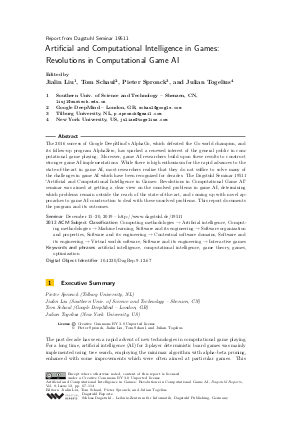Artificial and Computational Intelligence in Games: Revolutions in Computational Game AI (Dagstuhl Seminar 19511)
Authors Jialin Liu, Tom Schaul, Pieter Spronck, Julian Togelius and all authors of the abstracts in this report
-
Part of:
Issue:
Dagstuhl Reports, Volume 9, Issue 12
Part of: Volume: Dagstuhl Reports, Volume 9
Part of: Journal: Dagstuhl Reports (DagRep) - License:
 Creative Commons Attribution 3.0 Unported license
Creative Commons Attribution 3.0 Unported license
- Publication Date: 2020-04-14
File

PDF
DagRep.9.12.67.pdf
- Filesize: 10.5 MB
- 48 pages
Document Identifiers
Subject Classification
ACM Subject Classification
- Computing methodologies → Artificial intelligence
- Computing methodologies → Machine learning
- Software and its engineering → Software organization and properties
- Software and its engineering → Contextual software domains
- Software and its engineering → Virtual worlds software
- Software and its engineering → Interactive games
Keywords
- artificial intelligence
- computational intelligence
- game theory
- games
- optimization
Metrics
- Access Statistics
-
Total Accesses (updated on a weekly basis)
0Document
0Metadata
Abstract
The 2016 success of Google DeepMind’s AlphaGo, which defeated the Go world champion, and its follow-up program AlphaZero, has sparked a renewed interest of the general public in computational game playing. Moreover, game AI researchers build upon these results to construct stronger game AI implementations. While there is high enthusiasm for the rapid advances to the state-of-the-art in game AI, most researchers realize that they do not suffice to solve many of the challenges in game AI which have been recognized for decades. The Dagstuhl Seminar 19511 "Artificial and Computational Intelligence in Games: Revolutions in Computational Game AI" seminar was aimed at getting a clear view on the unsolved problems in game AI, determining which problems remain outside the reach of the state-of-the-art, and coming up with novel approaches to game AI construction to deal with these unsolved problems. This report documents the program and its outcomes.
Cite As Get BibTex
Jialin Liu, Tom Schaul, Pieter Spronck, and Julian Togelius. Artificial and Computational Intelligence in Games: Revolutions in Computational Game AI (Dagstuhl Seminar 19511). In Dagstuhl Reports, Volume 9, Issue 12, pp. 67-114, Schloss Dagstuhl – Leibniz-Zentrum für Informatik (2020)
https://doi.org/10.4230/DagRep.9.12.67
BibTex
@Article{liu_et_al:DagRep.9.12.67,
author = {Liu, Jialin and Schaul, Tom and Spronck, Pieter and Togelius, Julian},
title = {{Artificial and Computational Intelligence in Games: Revolutions in Computational Game AI (Dagstuhl Seminar 19511)}},
pages = {67--114},
journal = {Dagstuhl Reports},
ISSN = {2192-5283},
year = {2020},
volume = {9},
number = {12},
editor = {Liu, Jialin and Schaul, Tom and Spronck, Pieter and Togelius, Julian},
publisher = {Schloss Dagstuhl -- Leibniz-Zentrum f{\"u}r Informatik},
address = {Dagstuhl, Germany},
URL = {https://drops.dagstuhl.de/entities/document/10.4230/DagRep.9.12.67},
URN = {urn:nbn:de:0030-drops-120113},
doi = {10.4230/DagRep.9.12.67},
annote = {Keywords: artificial intelligence, computational intelligence, game theory, games, optimization}
}
